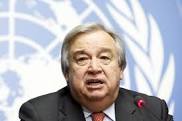“Africa has the highest rates of hunger in the world and Agricultural and livestock productivity is under threat,” UN Secretary General António Guterres has told a high level meeting at the African Union (AU) summit in Addida Ababa over the weekend.
The UN chief said world hunger is on the rise, after a period of prolonged decline.
He said hunger, food insecurity and poverty are closely linked, stressing the need for sustainable and inclusive agricultural growth in order to achieve both SDG1 on poverty and SDG2 on hunger.
This, he said also influences many other Goals.
“This means adopting national agricultural policies and investment plans that focus not only on agricultural sector development, but on poverty, hunger and resilience to climate change,” the UN Secretary General.
Guterres was speaking at the High-Level Event on “Renewed Partnership to End Hunger in African by 2025 – Five Years Later: Taking Stock of Progress and Lessons in Light of the Sustainable Development Goals” in Addis Ababa.
He linked the chronic food insecurity and rise in hunger to climatic shocks, environmental degradation, crop and livestock price collapse and conflict.
“Climate change adaptation should be promoted as an integral part of conflict prevention, with special attention to sustainable agriculture and pastoralist and semi-pastoralist livelihoods,” the UN chief said.
He then called for stronger commitment by governments, the African Union and the United Nations, something he says is needed to promote peace, human rights and sustainable development also as instrument to fight hunger.
“That means preventive interventions to break the link between food insecurity and conflict, such as shielding consumers and producers from food price shocks through price stabilization measures and social protection interventions,” Guterres said.
He said to build and sustain peace and address hunger and poverty, there is a need for community-based approaches that build social cohesion and the capacity of local institutions and actors.
“Improved governance that can deliver equitable services is essential. Social protection is needed to complement development efforts. The poor need to be helped from the poverty trap and given the tools to ensure they do not slide back,” the UN Secretary General added.
He told the gathering that gender equality is also essential and will help us accelerate progress towards achieving food security and nutrition.
Women are said to represent 60 per cent of the agricultural workforce in parts of Africa and the UN boss said they make crucial contributions to food production, food processing and marketing.
He took development partners to task for giving “too little attention” to mobilizing resources and investment on implementation and capacity building,” with much of their efforts being put on developing policies and programmes.
The UN Secretary chief said although many African countries to increase expenditures on agriculture, “only five countries have met the 10 per cent target of the Comprehensive Africa Agriculture Development Programme.”
“Governments need to create conditions for much greater investment by the private sector in enterprises that can generate benefits for the poor and the food-insecure,” Guterries said.
Meanwhile, the UN Secretary General is calling on all stakeholders to be accountable for commitments.
“That means generating and sharing data and information on policy and institutional changes, resource allocations and investments, and progress on SDG1 and SDG2 and related national and regional goals and targets,” Guterres added.

